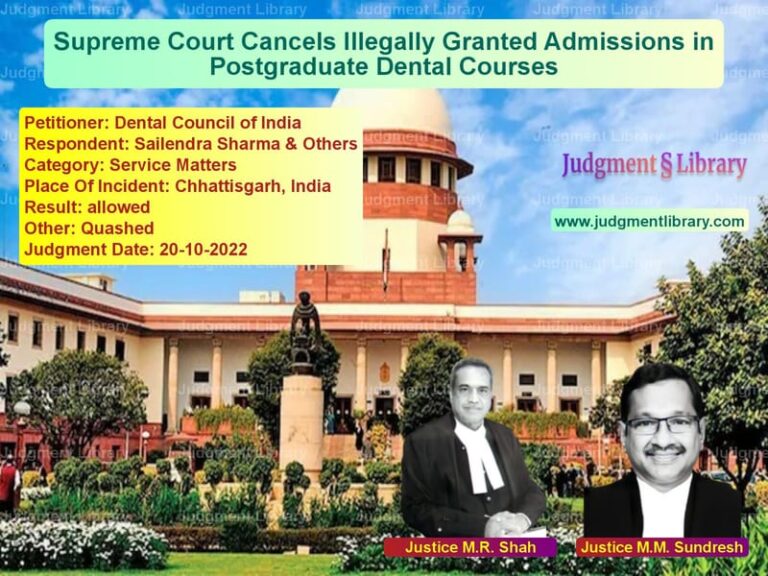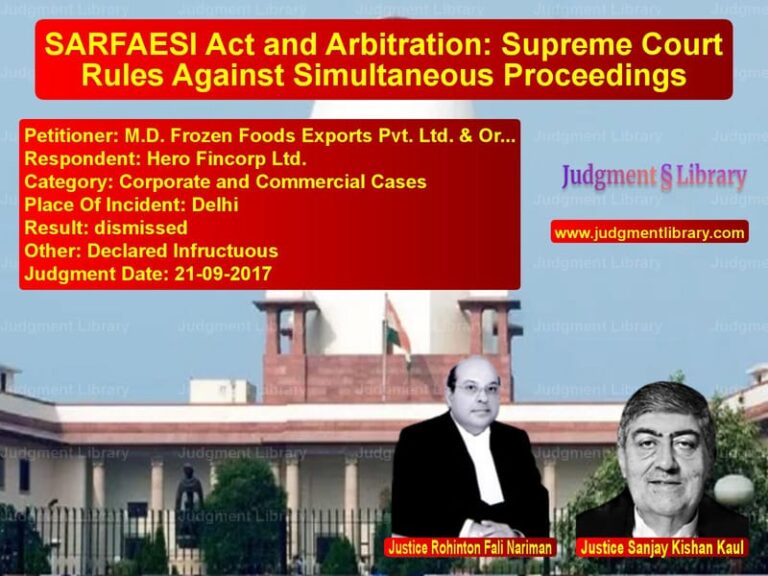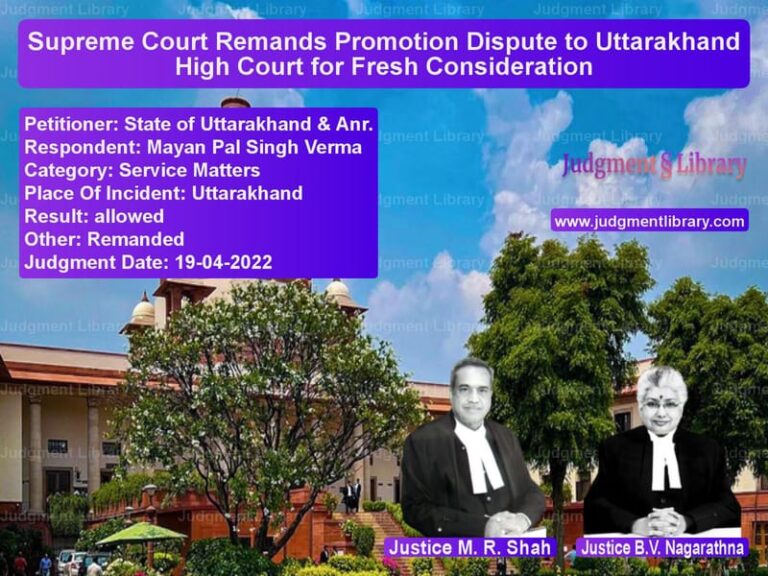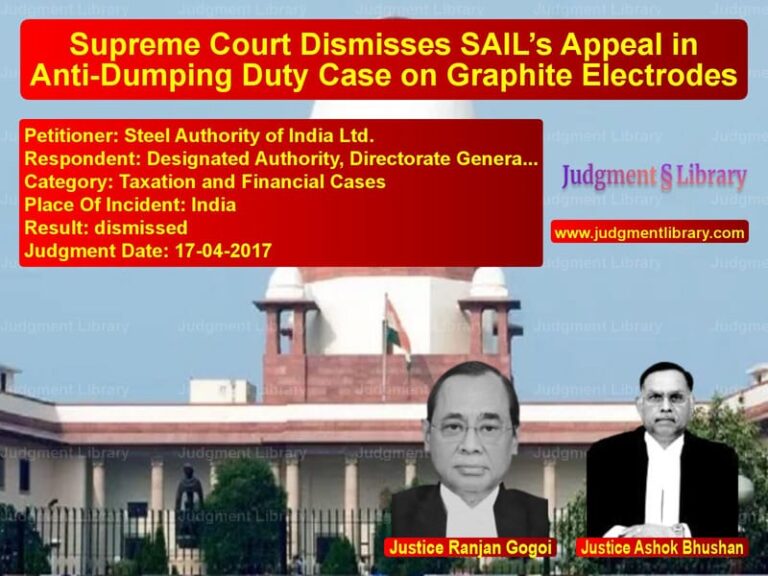Land Ownership Dispute: Supreme Court Rules on Revenue Records and Title Claims
The Supreme Court of India, in its judgment dated 06 February 2020, addressed a contentious land ownership dispute that revolved around rectification of revenue records, claims of tenancy, and acquisition by the State of Tamil Nadu. The case involved an appeal by M/s Edelweiss Asset Construction Company Limited against the decision of the High Court, which had restored the patta (land record) in favor of R. Perumalswamy.
Background of the Case
The dispute originated from land situated in Porur Village, Ambattur Taluk, Tiruvallur District, Tamil Nadu. The State Government had issued notifications under the Land Acquisition Act, 1894, acquiring 49.67 acres of land between 1961 and 1963. The land in question was later assigned to WS Industries (India) Ltd (WSIL) under a deed of assignment dated 26 February 1964, for the establishment of a factory.
WSIL, over the years, obtained loans from banks by mortgaging parts of the land. The dispute arose when R. Perumalswamy, the respondent, filed an application before the District Revenue Officer (DRO) in 2015, seeking rectification of revenue records, claiming that his father had originally owned the land and had leased it to WSIL for 50 years.
The DRO ruled in favor of the respondent, ordering the cancellation of the patta in WSIL’s name and restoring it to Perumalswamy. Aggrieved by this decision, WSIL challenged it before the Madras High Court. A single judge ruled in favor of WSIL, but a Division Bench of the High Court overturned this decision, restoring the DRO’s order. This prompted the appeal before the Supreme Court.
Arguments of the Parties
Appellants (WSIL & Edelweiss Asset Construction Co Ltd) Argued:
- The land had been duly acquired by the State of Tamil Nadu under the Land Acquisition Act, and it vested absolutely with the government.
- Upon acquisition, all prior ownership claims were extinguished.
- The respondent’s claim was based on an alleged oral lease, which was neither proven nor supported by any documentary evidence.
- The DRO exceeded its jurisdiction by adjudicating a title dispute under the pretext of rectifying land records.
Respondent (R. Perumalswamy) Argued:
- His father had acquired the land under a registered sale deed dated 9 October 1929.
- WSIL was merely a lessee and had no ownership rights over the land.
- After the expiration of the alleged lease period of 50 years, the land should rightfully revert to him.
- The revenue records incorrectly listed WSIL as the owner, warranting correction.
Supreme Court’s Analysis and Observations
1. Vesting of Land in the State Government
The Court noted that the land had been acquired by the State under the Land Acquisition Act, 1894, and thereafter assigned to WSIL. The deed of assignment specifically recorded that:
“The lands vested absolutely in the State Government free from all encumbrances.”
The Court held that any prior ownership claims stood extinguished once the land was acquired by the government.
2. No Proof of Oral Lease
The respondent’s case relied on an alleged oral lease granted by his father to WSIL in 1962. However, the Court observed:
“Neither the sale deed of 1929 nor the terms of the alleged oral lease have been produced in the course of the proceedings.”
The Court ruled that in the absence of documentary proof, the respondent’s claim had no legal standing.
3. Limited Jurisdiction of Revenue Authorities
The Supreme Court criticized the DRO’s decision, holding that:
“The DRO exceeded his jurisdiction by engaging in an exercise of investigating the title to the disputed land and substituting the first respondent with the appellant in the land records.”
It reaffirmed that revenue authorities are not empowered to adjudicate title disputes and that such matters must be addressed through civil courts.
4. Bar on Revenue Court’s Jurisdiction
The Court referred to Section 14 of the Tamil Nadu Patta Pass Book Act, which provides that any dispute regarding ownership must be settled by a competent civil court, stating:
“If any person is aggrieved by an entry made in the patta pass book, he may institute a suit for declaration of his rights under Chapter VI of the Specific Relief Act, 1963.”
The Supreme Court held that instead of approaching the DRO, the respondent should have filed a civil suit.
5. Procedural Lapses
The Court found procedural lapses in the way the DRO handled the case:
- WSIL was not given a fair opportunity to present its case.
- The decision was based on a revenue officer’s report, which was not furnished to WSIL.
- The respondent waited until 2015 to challenge the patta, despite his father passing away in 2004.
Final Judgment
The Supreme Court ruled in favor of WSIL and Edelweiss Asset Construction Co Ltd, setting aside the High Court’s judgment and restoring the single judge’s order. The DRO’s order was declared null and void.
The Court concluded:
- “The first respondent had no locus to pursue the application before the DRO for correction of land records.”
- “The appeals are allowed, and the order of the DRO dated 28 December 2015 is set aside.”
- “The Court has had no occasion to make any observation on the merits of the show cause notice issued by the State of Tamil Nadu for resumption of the lands.”
Conclusion
The judgment is a significant reaffirmation of the principles governing land acquisition and the jurisdiction of revenue authorities. It emphasizes that:
- Land acquired by the government vests absolutely, extinguishing all prior claims.
- Revenue authorities cannot adjudicate ownership disputes; such matters must be settled through civil courts.
- Claims based on oral leases or unverified documents cannot override government acquisition.
By quashing the DRO’s order, the Supreme Court upheld the integrity of land acquisition laws and ensured that revenue records are not arbitrarily altered based on unverified claims.
Petitioner Name: M/s Edelweiss Asset Construction Company Limited.Respondent Name: R. Perumalswamy and Others.Judgment By: Justice Dhananjaya Y Chandrachud, Justice Ajay Rastogi.Place Of Incident: Porur Village, Tamil Nadu.Judgment Date: 06-02-2020.
Don’t miss out on the full details! Download the complete judgment in PDF format below and gain valuable insights instantly!
Download Judgment: Ms Edelweiss Asset vs R. Perumalswamy and Supreme Court of India Judgment Dated 06-02-2020.pdf
Direct Downlaod Judgment: Direct downlaod this Judgment
See all petitions in Property Disputes
See all petitions in Landlord-Tenant Disputes
See all petitions in Judgment by Dhananjaya Y Chandrachud
See all petitions in Judgment by Ajay Rastogi
See all petitions in allowed
See all petitions in supreme court of India judgments February 2020
See all petitions in 2020 judgments
See all posts in Civil Cases Category
See all allowed petitions in Civil Cases Category
See all Dismissed petitions in Civil Cases Category
See all partially allowed petitions in Civil Cases Category







